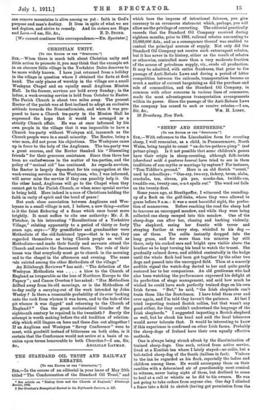CHRISTIAN UNITY.
[To THE EDITOR OF THE " SPECTATOR.") SIR,—When there is much talk about Christian unity and little action to promote it, you may think that the example set in an obscure little village in the Yorkshire Dales deserves to be more widely known. I have just returned from a holiday in the village in question where I obtained the facts at first band. The only places of worship in the village are a small Wesleyan Chapel and an equally small Anglican Mission Hall. In the former, services are held every Sunday ; in the latter, a week-evening service is held from October to Easter. The Parish Church is about two miles away. The present Rector of the parish was at first inclined to adopt an exclusive attitude towards the Nonconformists, and when it was pro- posed to have a Church tea-party in the Mission Hall he expressed the hope that it would be arranged as a strictly Church affair. He was at once informed by his own people in the village that it was impossible to have a Church tea-party without Wesleyan aid, inasmuch as the Church people were in a small minority. The Rector, being a wise man, did not press his objections. The Wesleyans came up in force to the help of the Anglicans. The tea-party was a great success, and the Rector thanked his "Dissenting friends " for their generous assistance. Since then there has been no exclusiveness in the matter of tea-parties, and the policy of " mutual aid " has continued. As regards services, the Rector is largely dependent for his congregation at the week-evening service on the Wesleyans, who, I was informed, will never miss the service if they can possibly help it. On the other band, Anglicans will go to the Chapel when they cannot get to the Parish Church, or when some special service is being held. Here indeed is a case of Christians holding the faith in unity of spirit and the bond of peace !
But such close association between Anglicans and Wes- leyans in a small village is not, I believe, a new thing—rather is it the faint flickering of a flame which once burnt more brightly. It must suffice to cite one authority: Mr. J. S. Fletcher, in his interesting "Recollections of a Yorkshire Village," relating apparently to a period of thirty or forty years ago, says :—" My grandfather and grandmother were Methodists of the old-fashioned type—that is to say, they regarded themselves as being Church people as well as Methodists—and made their family and servants attend the Church and receive the Sacrament there. The rule of their house was that everybody must go to church in the morning and to the chapel in the afternoon and evening. The same rule existed among the other Methodists of the village."
An Edinburgh Reviewer* has said: "The defection of the Wesleyan Methodists was . . . . a blow to the Church of England as irreparable as the loss of Northern Europe to the Papacy" ; and Canon Overton t has asked : " Has Methodism drifted away from its old moorings, or is the Methodism of to-day really a carrying-out of the work intended by John Wesley ? Is there a reasonable probability of its ever 'looking unto the rock from whence it was hewn, and to the hole of the pit whence it was digged' and returning to the Church of England?" Can the great ecclesiastical blunder of the eighteenth century be repaired in the twentieth ? Surely the attempt is worth making before the old tradition of relation- ship which still lingers on here and there dies out altogether ! If an Anglican and Wesleyan " Savoy Conference" were to meet, with goodwill instead of bitterness on both sides, is it certain that the Conference would not arrive at a basis of re- union upon terms honourable to both Churches P—I am, Sir,
N.














































 Previous page
Previous page